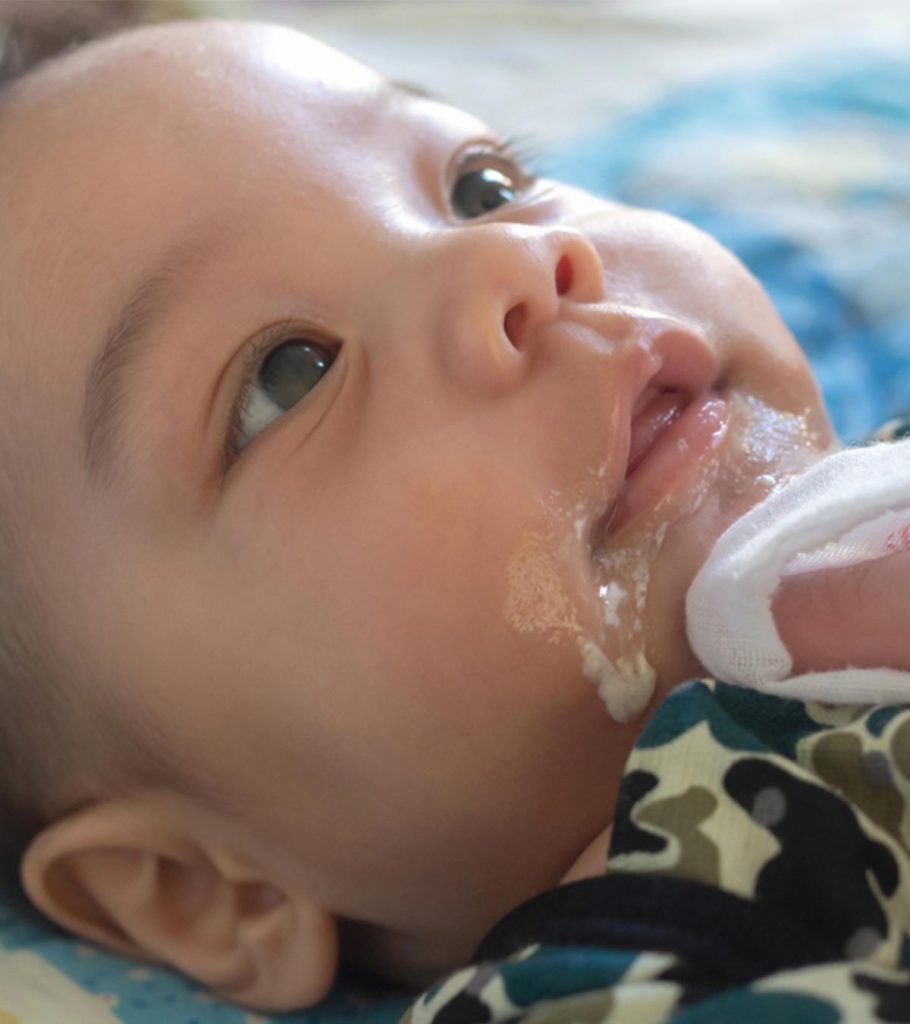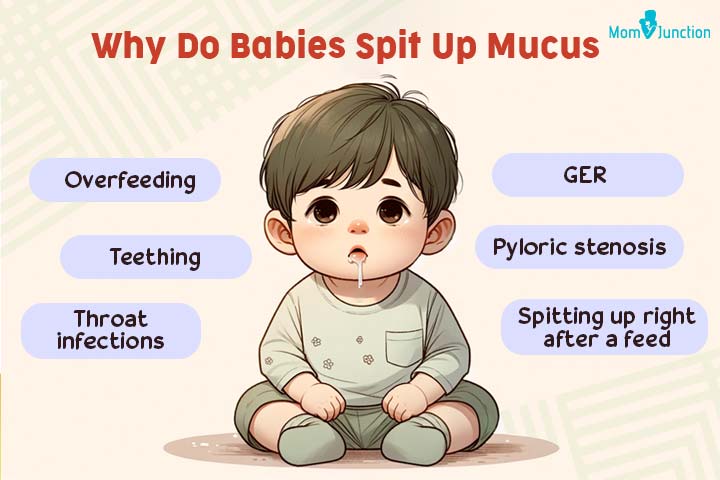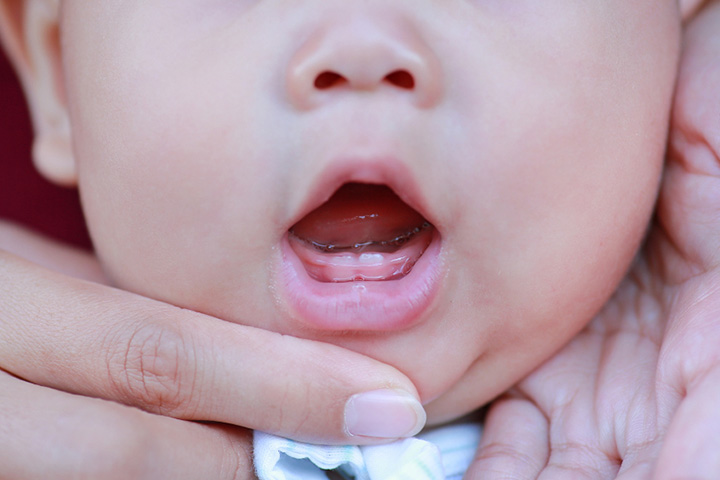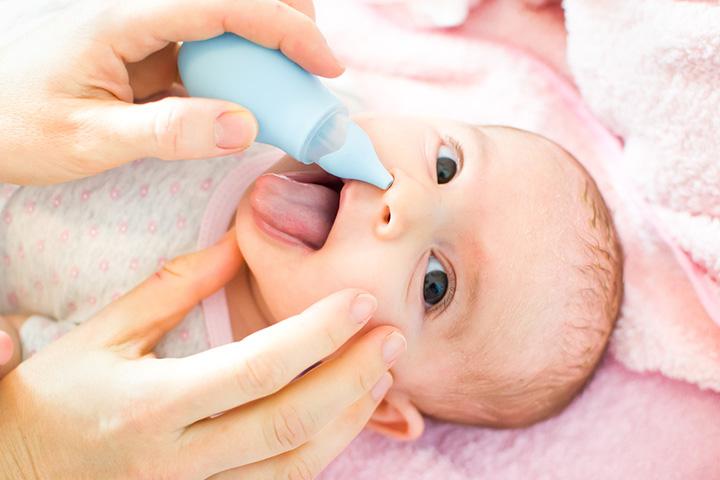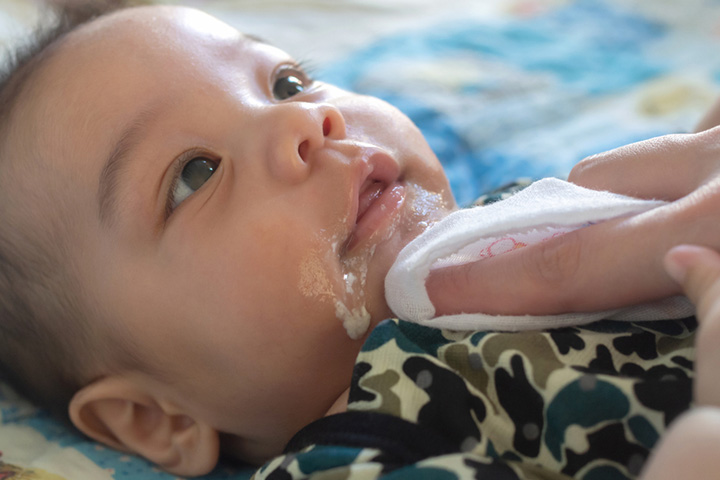An immature digestive system or poor valve closure (pyloric sphincter) in the upper end of the stomach is responsible for your baby throwing up mucus or milk. While it is normal for babies to spit up occasionally, it may be a cause for concern if it happens quite often. However, many factors can cause it to happen often, and it can be treated based on the underlying cause.
Read this post to know why your baby spits up mucus and some management options for this condition.
How Normal Is It For A Baby To Spit Up Mucus?
While it is normal for babies to spit up mucus or milk occasionally, you should be concerned if it becomes a repeated occurrence (more than a few times a day). If the mucus contains traces of blood or you notice signs of distress or irritation in your baby, it is important to seek medical attention.
So, what could be the possible reasons behind babies spitting up mucus? Read the next section to find out.
Why Do Babies Spit Up Mucus?
If you notice that your infant or baby spits up clear liquid or is regurgitating milk or food, it’s likely just a result of an immature digestive system and not a cause for concern. However, there could be other reasons as well. Let’s find out.
1. Overfeeding
As your baby’s digestive system is underdeveloped, it may struggle to handle extra food. So, if you overfeed your baby, they might spit up or vomit the excess food.
If your baby vomits, do not force-feed them to compensate for the vomited food, as it would only lead to more vomiting.
2. Spitting up right after feeding
Sometimes, you might find your baby spitting up clear liquid just after feeding. You might also find secretions that are white, milky, or clear after burping. This could be due to their developing digestive system.
3. Teething
Babies usually start teething between six and twelve months. It can cause major discomfort for the baby. One of the common symptoms of teething is drooling. The salivary reflex is stimulated by eruptions of teeth during teething, which results in excess production of saliva (2).
Sometimes, babies can also spit up the excess saliva in the form of a clear liquid. In case your baby spits up more than usual while teething, look out for occasional coughing or gagging and skin rashes around the mouth, cheeks, chin, and neck area (3).
4. Gastroesophageal reflux (GER)
GER is a condition in which the contents of the stomach flow back into the esophagus. It generally occurs due to the underdeveloped lower esophageal sphincteriXA high-pressure zone that protects the esophagus from highly acidic stomach secretions in babies. The condition occurs in 40–65% of infants between the ages of one and four months.
In the case of GER, you would notice your baby spitting up mucus and vomiting due to the forceful expulsion of gastric material from the mouth. Besides spitting up and vomiting, if your baby cries excessively (coliciXFrequent, prolonged, and intense crying by an otherwise healthy baby with no apparent cause of distress), has trouble swallowing, feels irritable after feeding, or gags continuously, it could be GER (4).
GER is common in infants. As the graph depicts, children till the age of one can be affected by GER, and incidence was higher (59%) in infants at three months of age (12).. The prompt diagnosis of GER in babies relies on identifying the signs and symptoms and can be difficult as these symptoms are non-specific such as spit up of mucus.
Occurrence of Gastroesophageal Reflux (GER) and Gastroesophageal Reflux Disease (GERD) in infants aged 1-12 Months
Source: Natural history of gastroesophageal reflux in infancy: new data from a prospective cohort; BMC Pediatrics
David Seitz, MD, a board-certified physician in New York, says, “There are many potential reasons why your baby’s spit up may be thick and mucus-like. It could be a sign of an allergy or intolerance, gastroesophageal reflux disease (GERD), or simply a sensitivity to certain foods.”
5. Pyloric stenosis
This is a condition of the gastrointestinal tract that may cause your baby to spit up and vomit. In pyloric stenosis, the lower part of the stomach that connects the intestines (pylorus) narrows, preventing the food from the stomach from entering the small intestine.
This condition affects three out of 1,000 babies in the U.S., and male babies are four times at a higher risk of developing it than female babies. Babies with pyloric stenosis are not born with it but develop it between three and five weeks of life. Although the exact cause is unknown, it is seen in babies whose mothers took antibiotics during the end of pregnancy or breastfeeding.
Along with spitting, you may also notice projectile vomiting, which is characterized by the forceful ejection of breast milk or formula from the mouth, fewer and smaller stools, failure to gain weight, and lethargy (6).
6. Throat infections
Sometimes, throat infections can also lead to the spitting up of mucus in babies. One such infection is epiglottitis, a severe infection of the flap of tissue above the vocal cords. It generally covers the windpipe during swallowing. Along with drooling and spitting, this condition also causes severe sore throat and fever (7). Note that your baby requires emergency care if they have this condition, as it could shut off the airway.
How To Stop A Baby From Spitting Up Mucus
Spitting up mucus or milk is normal in babies and does not need any special attention. It might subside once your baby’s digestive system matures to handle the food. However, if your baby often spits up and shows additional symptoms, consider following the tips mentioned below.
- Keep your baby’s feeding patterns in mind, and do not overfeed them. One way to deal with this is to decrease each feeding quantity while increasing the frequency of feeding. This would help your baby get the necessary nutrients while giving their immature digestive tract enough time to process food.
- If the spitting up is due to teething, try to give your baby a frozen teether to chew on, gently massage your baby’s gums with a clean finger, and continue to breastfeed to help soothe their sore gums.
- To keep GER symptoms in check, try to elevate your baby’s head after feeding, ensure you burp your baby after each feeding, and thicken the formula milk after consulting with your pediatrician.
- Talk to your pediatrician if your baby is diagnosed with more severe issues such as pyloric stenosis or bacterial infections.
- If your baby’s nose is filled with mucus, they may not know how to sneeze and get it out. So, when the mucus enters the throat, they might swallow or spit it up. To prevent this, you can suck mucus out of your baby’s nose using a bulb syringeiXA tool used to suck out mucus from a baby’s nose gently.
According to Dr. Seitz, “Make sure they’re getting plenty of fluids. You can do this by breastfeeding them or offering extra formula if they’re bottle-fed. Additionally, you can try using a saline nasal spray or drops to help loosen any congestion. Finally, make sure your baby is getting plenty of rest to help them recover from whatever is causing their mucus production.”
When To Call Your Doctor?
Call your doctor if (8)
- You notice faint blood traces in the spit-up. This could be due to the inflammation of the esophageal tissue. Also, if your baby spits up dark brown blood, you may have to seek medical attention.
- Your baby spits up milk that turns blue. This could be due to an airway or intestinal obstruction.
- Your baby is less than 12 weeks, and the spitting up of mucus has changed to vomiting.
- You notice signs of epiglottitis in your baby.
- The baby stops gaining weight.
- The baby is lethargic and has trouble feeding.
Dr. Seitz suggests, “If your baby is regularly spitting up thick, mucus-like spit, it’s important to talk to your pediatrician to rule out any underlying health conditions. Allergies and intolerances can be treated with dietary changes, while GERD may require medication.”
Baby spitting up curdled milk is generally not a cause for concern. Experts suggest that normal spit-up can take on various appearances, such as clear, white, yellow, curdled, non-curdled, or it may even look like mucus (12).
An immature digestive system could result in the baby spitting up mucus. It is normal if it happens occasionally. However, frequent spitting up may indicate underlying problems. While a few of the reasons could be harmless, like teething or overfeeding, other reasons such as GERD or throat infections could cause complications if not treated promptly. Talk to a pediatrician regarding the causes of the spitting and make changes in their feeding pattern accordingly. With these changes, the spitting up might subside on its own. However, if you notice any other concerning signs, consult a doctor for prompt medical attention.
Key Pointers
- Babies may spit up mucus due to many reasons, from overfeeding to underlying conditions such as pyloric stenosis.
- Feeding adequately, burping them, and offering teething toys may reduce some incidences of mucus spitting in babies.
- Seek medical care if your baby spits up frequently and the remedies are not helping.
